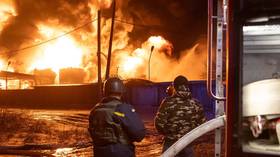Covid-19 lockdowns have little impact as greenhouse gas concentration continues to rise – UN agency
The World Meteorological Organization (WMO) has warned that CO2 concentration in the atmosphere is likely to go up in 2020 despite a reduction in global emissions due to Covid-19.
The WMO said in a bulletin released on Monday that the expected drop in global emissions in 2020 is just a “tiny blip” in the buildup of dangerous gases and is unlikely to cause a reduction in greenhouse gas concentration in the atmosphere.
The agency estimates state enforced lockdowns and a large drop in economic activity because of Covid-19 will contribute to a small reduction in global emissions in 2020, somewhere between 4.2 percent and 7.5 percent. The bulletin adds, “the impact of the COVID-19 confinements cannot be distinguished from natural variability.”
Many scientists and observers had anticipated a considerable drop in emissions this year as people around the world were forced to work from home, industrial output was cut and planes were grounded.
WMO Secretary-General Petteri Taalas said the rate of increase in greenhouse gas concentration, notably CO2, is a serious cause for concern and emphasized the need for a long-term plan to reduce emissions and combat climate change.
Also on rt.com The Greta Reset: Welcome to the UK 2030 - the no petrol, no transport, no freedom of movement Net Zero future“We breached the global threshold of 400 [CO2] parts per million in 2015. And just four years later, we crossed 410 ppm. Such a rate of increase has never been seen in the history of our records. The lockdown-related fall in emissions is just a tiny blip on the long-term graph. We need a sustained flattening of the curve,” Taalas said.
The WMO leader contended that the Covid-19 pandemic does provide a platform for “more sustained and ambitious climate action” which may be transformative in the fight against climate change. “There is no time to lose,” he added.
Think your friends would be interested? Share this story!












